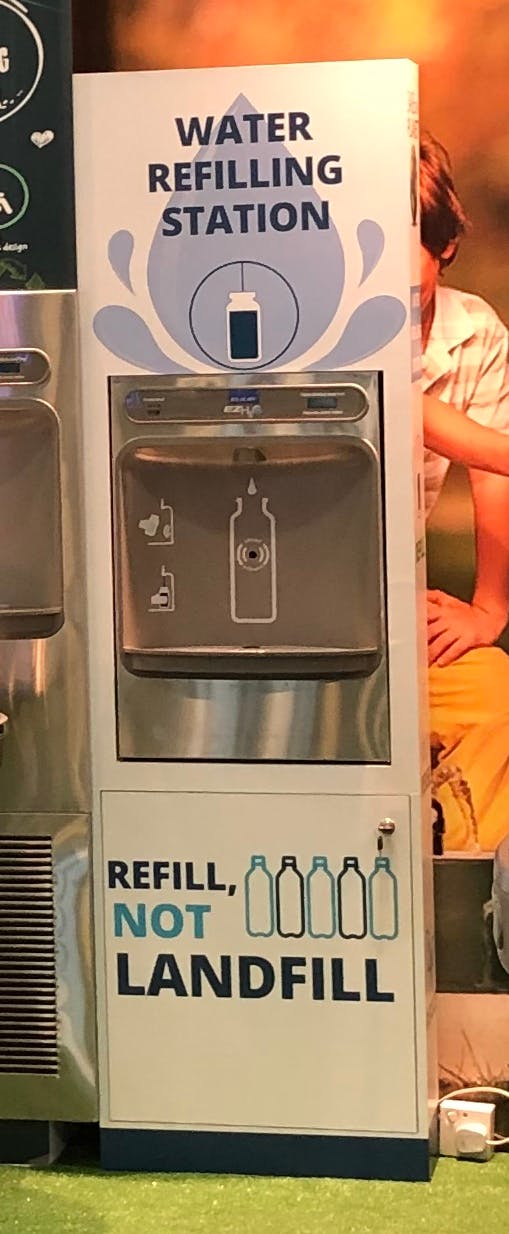A single 200-room four-star hotel can use about 300,000 pieces of single-use plastic in a month if it is at full-capacity and does not invest in any eco-friendly alternatives, according to calculations done by an expert for Eco-Business in the wake of several anti-plastic announcements by major hotel chains.
The estimate includes 20,000 plastic water bottles, 49,765 plastic amenities and amenity packages, 216,693 pieces of plastic for food and beverage operations, including plastic wrap, storage bags and latex gloves, and 13,375 plastic bags, which does not even include plastic laundry bags used by third-party services to protect laundered clothing for staff and guests, and bags used by food suppliers, said sustainability and plastics expert Marissa Jablonski.
The figures underscore the depth of the challenge for the hospitality industry—and the opportunity for change—as it gears up efforts to go plastic-free.
In August 2019, the Marriott group announced that it will replace most of its hotels’ single-use shampoo, conditioner and bath gel bottles with larger ones by 2020, preventing about 500 million of the tiny plastic bottles from reaching landfills yearly—equivalent to about 770 tonnes of plastic annually and 30 per cent of its current plastic use for amenities. Plastic straws and stirrers are also out, averting the disposal of one billion straws per year.
The Hilton chain has removed plastic straws from its hotel operations, saving over 250 million straws annually; switched from plastic key cards to digital ones at a number of hotels, staving off 40 tonnes of plastic waste so far; and eliminated plastic water bottles from meetings and events at hotels it manages in the Asia Pacific, Europe, Middle East and Africa.
It is also cutting back on single-use miniature toiletry bottles and seeking alternatives to plastic wrap for its food and beverage operations, among other actions. “We’re highly aware of the environmental damage that single-use plastic can cause, and take the global issue of plastic pollution very seriously,” said Paul Hutton, Hilton’s vice president of operations in Southeast Asia and executive sponsor of its plastics working group in Asia Pacific.
Promising but insufficient
While many of the major hotel chains have announced measures to reduce their plastic use, the industry as a whole can still do much more, added other experts.
Grace Kang, managing partner of Greenview, a Singapore-based sustainability consulting and research firm specialising in the hospitality sector, noted that its latest Green Lodging Trends Report 2018 surveyed 4,544 hotels in 61 countries, and just 30.7 per cent of them reported that they had eliminated or reduced to an absolute minimum their use of single-use plastic.
Another 38.1 per cent said they were making progress in doing so, but only 14.4 per cent said they would accomplish it within a year.
“Hotels should consider not using some plastic items at all,” said Kang. “If you have small bins in the guestrooms, you could revamp your waste collection practices so that you don’t need plastic bags in them.”
Other items that could be eliminated include combs, and plastic wrapping for amenities such as toothbrushes, Q-tips, shower caps, dental kits and sewing kits, but hotels get stuck on the idea that they have to offer these amenities. “Hotels could offer them only on demand instead. Many hotel guests are now eco-conscious, and research has shown that they would prefer to change their behaviour to support eco-friendly hotels,” she said.
“
Industry needs to come up with workable solutions for some of the plastic use.
Chew Siew Moon, Sustainability Manager, Singapore, Six Senses Hotels Resorts Spas
The third-party problem
Hoteliers noted, however, that convincing suppliers to the hospitality sector to ditch plastic is the next step in the journey.
The Six Senses group, which operates hotels, spas and resorts globally, has cut out plastic straws and disposable food and beverage containers, and uses glass water bottles instead of plastic ones. It also uses refillable dispensers for shampoo, conditioner and shower gel, and recycles or reuses coffee pods. Some properties also provide loose tea in paper pouches instead of tea bags, which traditionally contain plastic, among other measures.
The group has set the target of being plastic-free by 2022, and says it is 90 per cent there.
“We are now down to the finer details, such as how we get our suppliers to deliver food not in plastic containers, and how we convince local authorities to agree to alternatives to plastic wrap,” it continued.
Chew Siew Moon, Six Senses’ sustainability manager for its Singapore hotels, added that several of the group’s other properties offer guests non-plastic slippers that are washed in-house and reused, but the Singapore ones have not done so because of lack of space to install on-site washing infrastructure, and local laundry services refusing to handle slippers.
Silicon covers to replace plastic cling wrap for containers that do not have air-tight lids were also trialled in the hotels’ kitchens, but were too fragile. “We need to find a vendor who can work with us to reuse slippers, and industry needs to come up with workable solutions for some of the plastic use,” said Chew.
Water without waste
Eliminating plastic bottles, one of the biggest sources of plastic use in hotels, comes with its own challenges. At the Six Senses Singapore hotels, staff refill the glass bottles and clean up the mess when guests break them. “This is additional work for them that they are not used to. We have to make it clear to them at the interview stage that it is part of the job scope, and provide training,” said Chew.
Other hotels have taken a different approach by installing water bottle filling stations for guests to use. The US-based firm Elkay, which started selling such stations in 2010 in addition to its drinking fountains and water coolers, has supplied the Hilton group, Headland Hotel in Hong Kong, and the recently launched Hard Rock Hotel Desaru Coast in Malaysia.
The Elkay stations have several features that make them suitable for hotels, said a spokesperson. These include touchless sensor activation, a fast flow rate that can fill a one-litre bottle in 10 seconds to minimise queues even during peak hours, and a mechanism that cuts off water flow after 20 seconds to prevent wastage.

Image: Elkay
“Each station also has a ticker that displays how many plastic water bottles have been saved through its usage. This tally can be an important part of a hotel’s sustainability story. At the Hilton San Francisco Union Square hotel, our water bottle filling stations helped it to avoid using 200,000 plastic water bottles within 10 months,” said the spokesperson.
She noted that some hotels in Asia may be reluctant to install water bottle filling stations due to the poor quality of the local municipal water or customers’ longstanding distrust of public drinking and bottle filling stations. “In these cases, we provide point-of-use filtration systems that have anti-bacteria or active carbon filters, or both. The systems’ filter status monitor also assure guests that they are drinking clean, filtered water,” she said.
Hotels can also install freestanding versions of the bottle filling station and customise them with artwork and messages to further encourage guests to reduce waste. “Since 2010, our bottle filling stations have saved about 7 billion plastic water bottles from going into landfills, enough bottles to circle the globe 112 times,” said the spokesperson.
“There is little doubt about the impact of plastic water bottles on the environment,” she said. “There is also overwhelming evidence that supporting tap water consumption can have a positive impact on climate change and the environment as a whole, due to its contribution to reducing plastic litter and greenhouse gas emissions.”


















